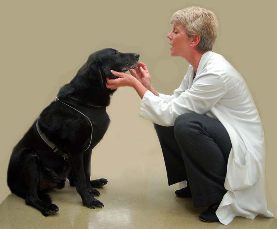A Gene Therapy Clinical Trial for Dogs with Glioma
By G. Elizabeth Pluhar, D.V.M., Ph.D., Dip ACVS1, John R. Ohlfest, Ph.D.2, and Matthew A. Hunt, M.D.3
1Department of Veterinary Clinical Sciences, College of Veterinary Medicine; 2Department of Pediatrics, School of Medicine; 3Department of Neurosurgery, School of Medicine
Gliomas, which arise from the “gluey,” or supportive, tissue of the brain, are common malignant brain tumors. For both dogs and people with these aggressive tumors, the prognosis is dismal. People with gliomas are usually treated by surgical removal of the tumor, a full course of radiation therapy, and chemotherapy. Despite this combination of therapies, the tumors grow back in five to six months, and life expectancy is 12 to 14 months. Dogs with this type of tumor have rarely been treated.
We are currently conducting clinical trials to find new and better ways to treat gliomas. In the past 12 months, we have recruited 10 dogs for a gene therapy study. Preliminary data hint at improved times of progression-free as well as overall survival in dogs treated with gene therapy. At present, median progression-free survival in dogs treated with gene therapy is six months and overall survival is about a year. This compares to progression-free and overall survival time of 55 days in dogs in the control group (no gene therapy). However, a definitive interpretation must await the final statistical analysis that will be performed at the end of this project. Neither the surgical tumor removal nor the gene therapy injections into the brain appear to have any adverse effects. Most dogs were well enough to be discharged from the hospital within 24 to 48 hours after surgery. At most, they experienced only mild weakness on one side of the body, which resolved within days.
All the dogs in the study received chemotherapy with a drug called temozolomide, which is the standard of care used in people with gliomas. Some dogs became nauseous from the temozolomide, but this was controlled by giving the drug at night on an empty stomach and with anti-nausea medication. We have not seen adverse side effects on blood cells or the major organs of the body. Similar to people undergoing surgery for brain tumors, these dogs are at a higher risk for developing pneumonia, which will resolve without complication if it is diagnosed and treated early in the disease process.
We are currently recruiting dogs into this clinical trial.
Eligible dogs must have a tentative diagnosis of a glioma based on MRI showing a tumor with the right characteristics. We also have another clinical trial for dogs with gliomas using vaccine therapy in addition to surgical removal of the tumor, similar to that described for dogs with meningiomas (see page 9). We are looking for 35 more dogs for these trials. Visit the CVM Clinical Investigation Center website at www.cvm.umn.edu/cic/current/braintumortrials for more information, applications to enroll dogs in clinical trials, or to make a contribution to support this research.

Help Future Generations of Dogs
Participate in canine health research by providing samples or by enrolling in a clinical trial. Samples are needed from healthy dogs and dogs affected by specific diseases.



